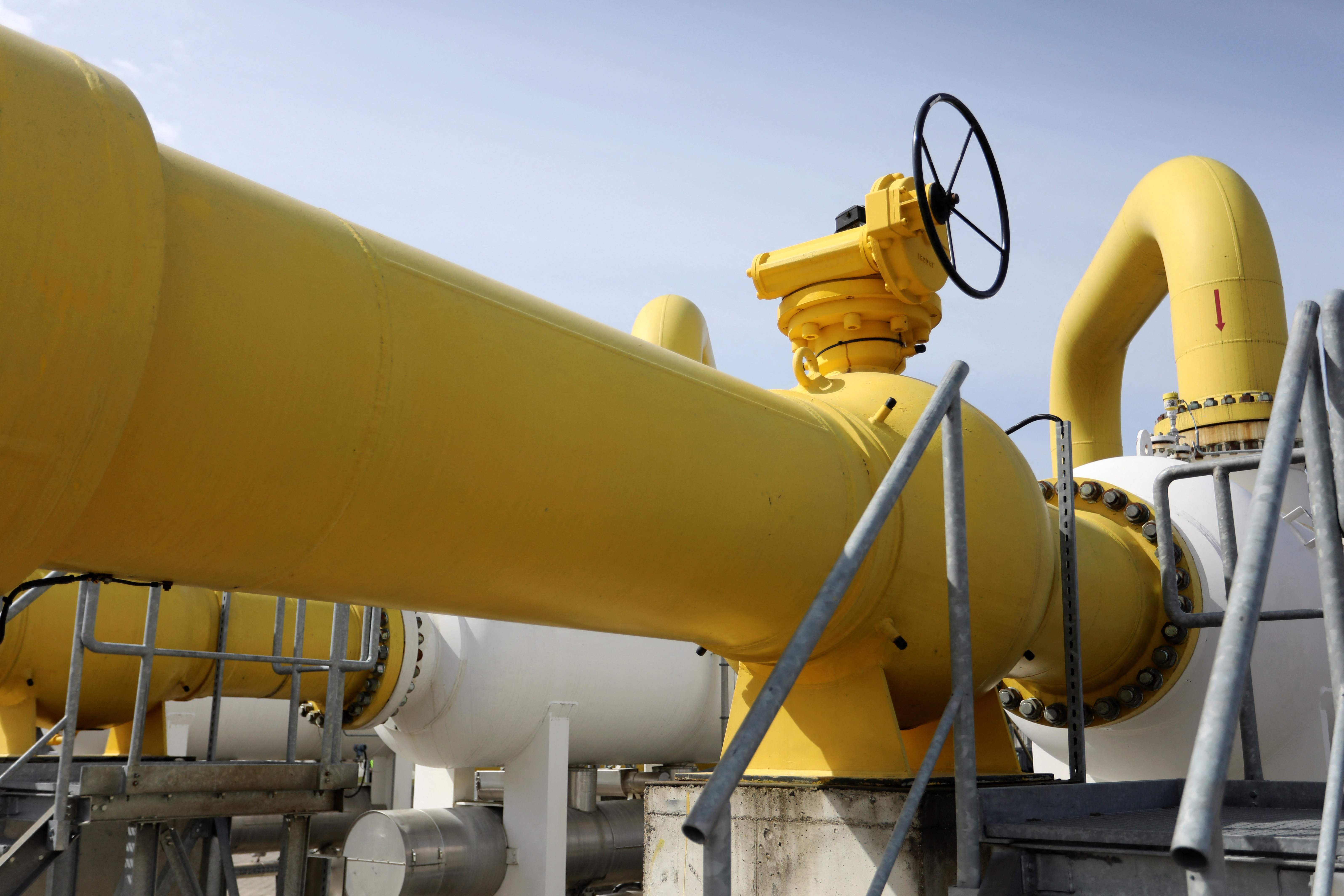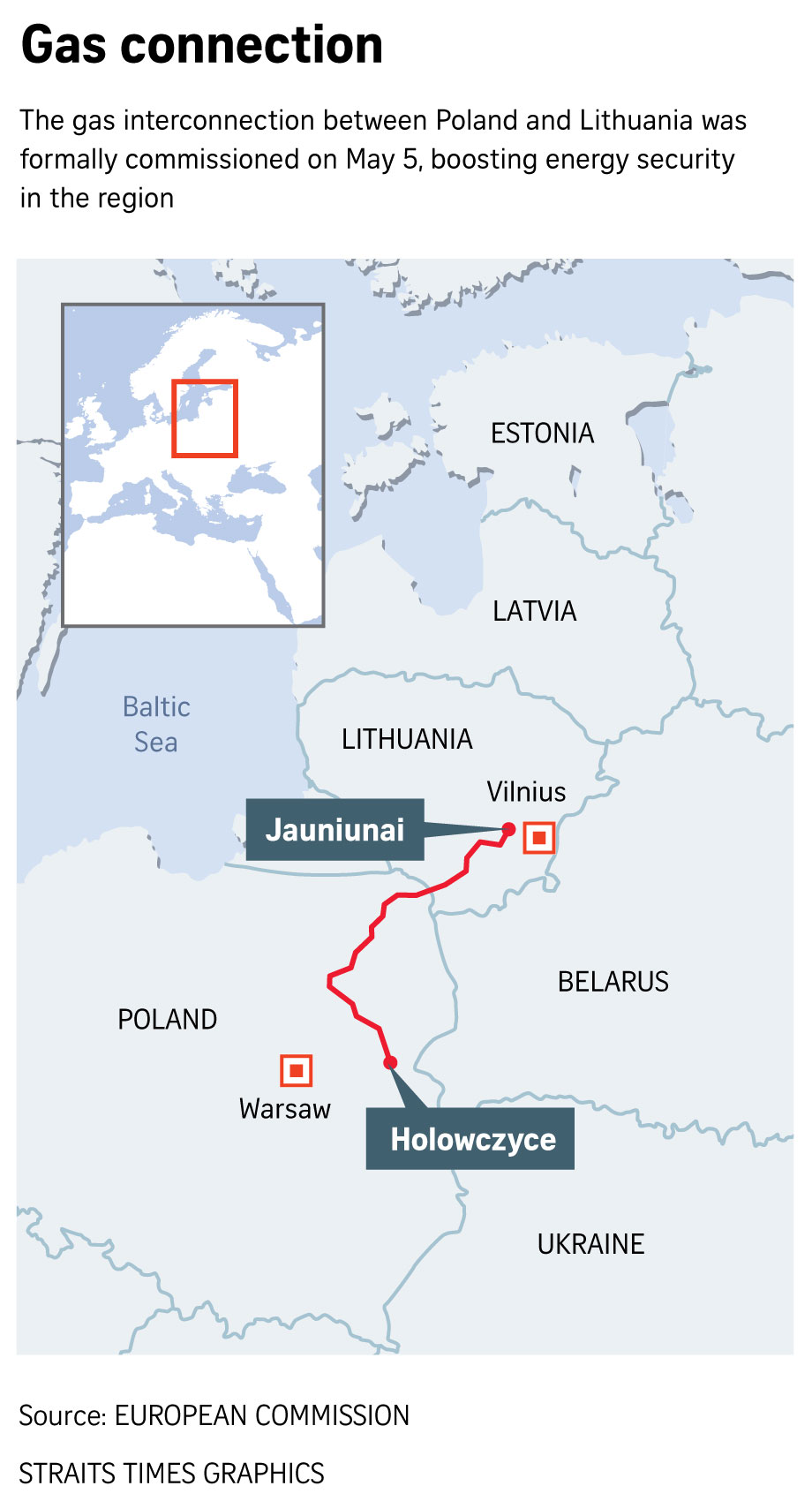New pipeline links Baltics to European gas network
Sign up now: Get ST's newsletters delivered to your inbox

The 508km pipeline will eventually be able to transport around 2 billion cubic metres of gas per year in either direction.
PHOTO: AFP
JAUNIUNAI, LITHUANIA (AFP, REUTERS, XINHUA) - Poland and the Baltic states on Thursday (May 5) inaugurated a new gas pipeline that links the north-eastern European countries with the rest of the European Union, a crucial step towards reducing dependence on Russian gas.
The 508km Gas Interconnection Poland-Lithuania (GIPL) pipeline links Poland and Lithuania's gas networks.
With first flows through the pipeline having already started on May 1, the capacity to transport gas from Lithuania to Poland is expected to reach 1.9 billion cubic metres per year (bcm/year) in the next five months and gas transportation capacity from Poland to Lithuania will be 2 bcm/year.
Thanks to existing links in the region, Latvia, Estonia and even Finland will also have access to the wider European gas pipeline network.
The EU's executive unveiled on Wednesday plans for a gradual ban on Russian oil imports as part of a raft of new sanctions to punish Moscow for invading Ukraine.
If approved by member states, the oil ban would be the EU's toughest move yet against the Russian energy sector, which helps the Kremlin finance its war.
The EU has yet to target Russian natural gas, used to heat homes and generate electricity across the bloc, and it is harder to replace than Russian crude.
The EU is the largest market for Russian natural gas exports, on which two of its largest economies – Germany and Italy – are highly dependent. France, the EU’s second largest economy, derives most of its electricity from nuclear power.
“Replacing petroleum imports will be much easier than replacing natural gas imports,” Dr Eugenio Pinto, a professor of business administration at the Department of Economics of Rome’s LUISS University, told Xinhua. “Petroleum shipments are much more mobile than gas shipments and there are more sources for supply.”
“Replacing petroleum imports will be much easier than replacing natural gas imports,” Dr Eugenio Pinto, a professor of business administration at the Department of Economics of Rome’s LUISS University, told Xinhua. “Petroleum shipments are much more mobile than gas shipments and there are more sources for supply.”
The EU member states have independently established timetables for reducing imports of Russian gas. In March, the bloc committed to reducing gas imports by two-thirds by the end of this year, and ending its dependence on Russian fossil energy entirely by 2030, though those plans did not include commitments for individual nations.
Last week, Russian state-owned natural gas company Gazprom halted deliveries to Poland and Bulgaria as it seeks to sow divisions between European nations that have imposed sanctions.
A cut off of Russian supplies threatens to cause shortages not only in those countries but potentially across Europe.
The growing number of interconnections between gas networks, however, means that European nations are better able to prevent Russia putting pressure on one country.
"Today, we are inaugurating our energy independence," Lithuanian President Gitanas Nauseda told a ceremony outside the capital Vilnius.
Poland's President Andrzej Duda added that the "interconnector is a response to blackmail" from Russia.
Poland has said it is ready to completely swear off Russian gas if necessary and the Baltic states of Lithuania, Latvia and Estonia announced at the end of last month that they were halting imports of Russian gas and would use their reserves.
All the nations are heavily dependent upon Russian gas imports.
The EU funded a large part of the 500 million euro (S$730 million) cost of the construction of the GIPL pipeline.
Attending the commissioning ceremony on Thursday, EU Energy Commissioner Kadri Simson said: "Today’s interconnection is another step in helping this region to be fully integrated into the internal EU energy market, diversifying away from Russian gas.
"This has become all the more important following Russia’s unilateral decision to disrupt gas supplies to Poland and the decision of the Baltic States not to import Russian gas."



